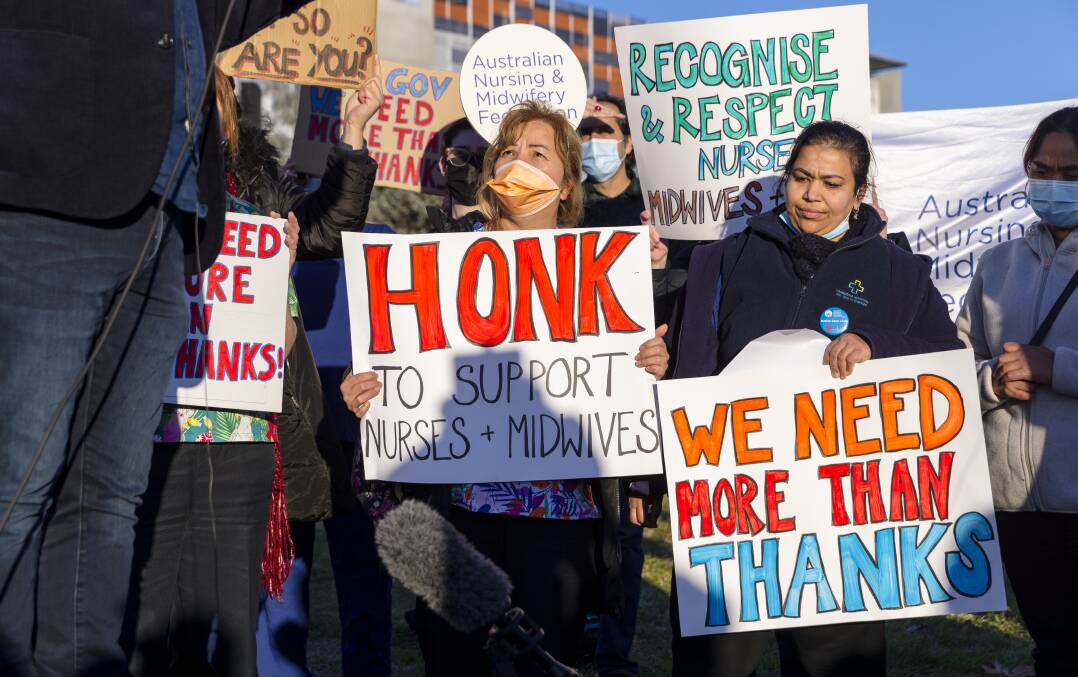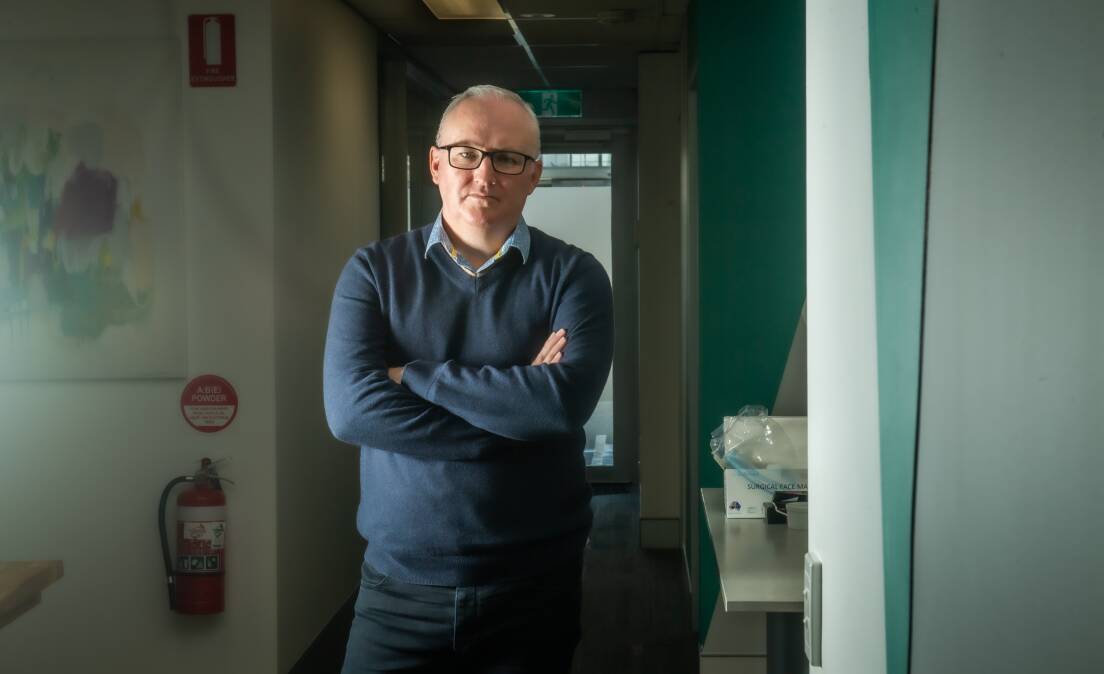
A lunch break is a rare event for Canberra Hospital emergency department nurse Sandy*.
But first she must overcome the walk to the tearoom, which fills her with an overwhelming sense of dread.
Patients line the walls of the corridor as the beleaguered department struggles to keep up with demand.
Beds in corridors have become so common in recent years there are even staff specifically rostered on to care for these patients. However, staffing shortages often mean this is the first position to go.
This means when Sandy (*not her real name) walks to her break, she fears she could come across a dead body.
"It's very, very, very common for nurses to be going to afternoon tea, lunch, a break ... and you'll walk past someone and they're barely conscious," she said.
"They're grey, they're blue, they're having a fit and no one is there looking after that person.
"Every time I walk down a corridor I'm terrified I'm going to find someone dead in a bed."
More than a dozen nurses and midwives have spoken to The Canberra Times on the condition of anonymity, detailing the issues they face on a day-to-day basis in the health system.
They have expressed fears the standard of care is dropping due to current conditions as burnout ravages the system.
Many are becoming disenchanted with the job they used to love so much and many are considering leaving.
"I don't enjoy work any more, I came here because I love nursing and I really care about patients ... I wonder at what point I will become disinterested in doing this."
"Most of us are getting to the end of our tethers and it's pretty insulting how much the hospital relies on the fact that nurses are empathetic and generally good-hearted people."
Skills mix concerns
Nurses say there are severe issues with the skills mix within the system as many senior and experienced nurses have left or cut back their hours.
As a result, the junior-heavy workforce has been left without proper training and mentoring and nurses have expressed fears this could compromise the quality of care.

"Our skills mix is really really bad in that we don't have a lot of experienced nurses. All experienced nurses are becoming part-time, so we're very junior-heavy in that sense, so that has a big effect on us," one nurse said.
Another said: "Junior staff are not getting the education they need to be able to fully understand the whole procedure, what they need to do, what they need to anticipate and what they can do if something goes wrong."
Every nurse who spoke to The Canberra Times said they felt burnt out and this burnout had contributed to staff leaving the service.
"Everyone is burnt out, everyone is at the limit of how much overtime they can do or how many extra shifts they can do," a nurse said.
"The morale is definitely not what it used to be because everyone is just exhausted.
"The most senior nurses with decades of experience and knowledge lost their passion for their careers as their ability to do their job properly was just completely snuffed out and they were just burnt out and left."
Canberra Health Services sent through a detailed statement in defence of its service in response to questions from The Canberra Times but did not directly answer a number of questions.
A spokesman said the organisation was committed to delivering quality and safe care to the community.
He pointed to a recent accreditation survey where Canberra Hospital met all criteria set by the Australian Council on Healthcare Standards.
"The independent surveyors, who undertook an extensive week-long review of our services, were highly complementary of the quality and safety of our care and the systems and processes which underpin it," the spokesman said.
The spokesman said a range of initiatives were being undertaken to ensure nurses were receiving the necessary training and there were programs to improve the skills and confidence of junior nurses.
"Our nurses and midwives are well-trained, and we value professional development," the spokesman said.
Over the past 12 months, 645 nursing staff have left Canberra Health Services. During that time almost 1100 staff have been employed in permanent, temporary and casual contracts. The spokesman did not say how many of the new staff were graduates, despite being asked by The Canberra Times.
Staffing shortages
Staffing shortages have been a huge issue over recent months, where up to 150 employees have been off each day, on average, due to unplanned leave.
With so much unplanned leave nurses were being constantly bombarded with text messages asking for people to do extra shifts and overtime.
"The staffing issues have become such a problem that every single day I start my day by being told we're 'X' amount of staff short, so it's demoralising from the get-go," one nurse said.
"It perpetuates a cycle where we're constantly fighting against the torrent of sick leave because shifts are then covered by people who are working overtime and then that creates exhaustion and burnout and then they call in sick."
During the first Omicron wave in January nearly 3000 shifts needed to be filled.
"[Staffing shortages] basically make it impossible for us to be able to do our job to the standard that we want to be able to do it," a nurse said.
The extraordinary pressures being faced by nurses and midwives mean they often missed out on meal breaks. Overtime was common.
But one nurse said when concerns were raised about missing breaks, management said staff needed to manage their time better.
"If you say, 'I didn't get to have my tea break today, can I have overtime for that'? Or, 'I was doing a resuscitation and so I have left an hour-and-a-half later for work, can I have some overtime'? They just tell us that we should get better time-management skills."

The Canberra Health Services spokesman did not respond to a question about whether the organisation believed this was an appropriate response.
While COVID had played a significant part in the current staffing shortages, nurses said they were sick of this being used as an excuse for everything. They said concerns about staff had been raised for years prior to COVID.
"The hospital is blaming it on COVID but this was an issue many years before COVID and then once COVID hit it has been a blanket response to say the issues are due to COVID. But it is absolutely not," one nurse said.
Canberra Health Services was asked how it responded to the assertions from nurses who were sick of COVID being blamed but this was not directly addressed.
The health services spokesman said the pressures of COVID-19 meant every health service in Australia was experiencing workforce pressures.
"The COVID-19 pandemic has placed unprecedented pressure on health systems across the world," the spokesman said.
"We are now facing the dual challenges of significant unplanned staff absences due to COVID-19, as well as an increase in people requiring our care."
Nurse-to-patient ratios have also been implemented in certain wards this year and the government has committed to introducing the second stage of this shortly.
Lack of support
Many of the nurses felt they were not receiving proper mental health support and this was most evident following traumatic events.
They said when traumatic events occurred there was often little support provided. At best, they said a debriefing session may be offered following but this was often held at inconvenient times, meaning not every person involved could attend.
A nurse who works in theatre said: "You don't get that time to grieve, or to just sit back and process what's happened."
Another said: "You need to support nurses to have job satisfaction to support their mental health because it is a challenging industry ... the short-staffing is just going to get worse."
An employee assistance program was available for staff at the Canberra Hospital but nurses said it could take months before the support could be offered.
The health services spokesman said staff wellbeing was a major priority but did not address a question about the wait for the assistance program. He said the organisation had a wellbeing strategy that offered an "evidence-based approach to staff wellbeing".
He pointed to a three-year wellbeing strategy that included supports such as workshops to educate staff on wellbeing, a music and mindfulness service, therapy dogs and seated massages.
"Many hundreds of staff have accessed these programs and initiatives over the past 12 months," the spokesman said.
"All staff have access to a range of support services including the employee assistance program [and] profession specific support services such as the nursing and midwifery support service and CHS spiritual support services."
The spokesman said Canberra Health Services would also hold a "wellbeing symposium" on August 1 with expert speakers. He said this would be streamed across health facilities and would also be recorded.

Nurses continue to fight
Over recent weeks, nurses and midwives have been rallying outside of Canberra's hospitals, demanding the government facilitate a clear recovery plan for nurses and midwives.
Australian Nursing and Midwifery Federation ACT branch secretary Matthew Daniel said the territory government needed to improve workforce planning and many of the staffing issues were foreshadowed even before COVID.
"We believe that the ACT government is playing a victim to COVID at the moment," he said.
Mr Daniel said many of the union's members had expressed a desire to leave the profession, including many senior and experienced workers.
"I'm talking about senior members who have got many, many years of experience," Mr Daniel said.
"I know there have been a number of farewells."
While many senior staff have left there were fears junior staff could also follow, as many were feeling burnt-out by the current state of affairs.
"Junior staff need support and we risk losing them if they are so shattered with the working conditions at the moment. And if they leave it just makes a bad situation even worse for our future," Mr Daniel said.
We've made it a whole lot easier for you to have your say. Our new comment platform requires only one log-in to access articles and to join the discussion on The Canberra Times website. Find out how to register so you can enjoy civil, friendly and engaging discussions. See our moderation policy here.







